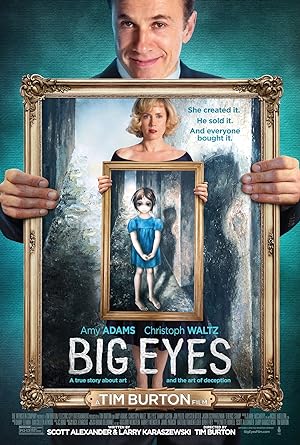Big Eyes is a true story about a single mother and painter who is undervalued by others and herself. She encounters a charming man who encourages and values her work and provides her with stability so she can keep custody of her child, but things go south when her paintings become a hit, and her husband transforms from genius promoter to entitled poseur. The line between empowerment and exploitation blurs.
Tim Burton hasn’t made a good movie in ages. Big Eyes is a good movie because it is an interesting story, and the cast elevates it from a tv movie, but it has none of Burton’s trademark flourishes or faces and is fairly conventional. The second half loses momentum. I don’t think the narration as a framing device works, but I also can’t stop thinking of Danny Huston as a vampire so that may be my fault. Amy Adams does a solid job as Margaret Keane, the famous painter who slowly reclaims her identity. Waltz is at his best in the first half when he has quiet moments of disappointment at his lack of talent to exhilarated team building manipulation, but as Big Eyes progresses, I think that Burton asked him to just hit one note because Waltz does and never lets up again. The provocative question, what is art, runs throughout the movie, but is underdeveloped and remains unanswered, but Burton suggests that a real artist is compelled to work regardless of recognition or reward because the work is their identity. Burton does get right the daily ways in which women’s work is undervalued and diminished while simultaneously essential and demanded.
I’m not a Jehovah’s Witness fan, but I do applaud Burton’s nuanced approach to the role of gender and the Bible. In one scene, Margaret Keane, who is not a Catholic, seeks guidance from a priest regarding lying, but is cut off and basically told that right or wrong, the man is the head of the household. In another scene, a group of women knock on her door to proselytize, but instead of dismissing her real life complaints, they giggle sympathetically, and the interaction encourages Margaret to see that real life is not divorced from Biblical theories of morality, but real life people must wrestle and reconcile with Biblical tenets. It also stresses the importance of differing perspectives on interpretation and understanding. The default norm for people should not be the male perspective, but people of all races and gender fully interacting with God in seeking the fullest way to live life more abundantly.
Stay In The Know
Join my mailing list to get updates about recent reviews, upcoming speaking engagements, and film news.





